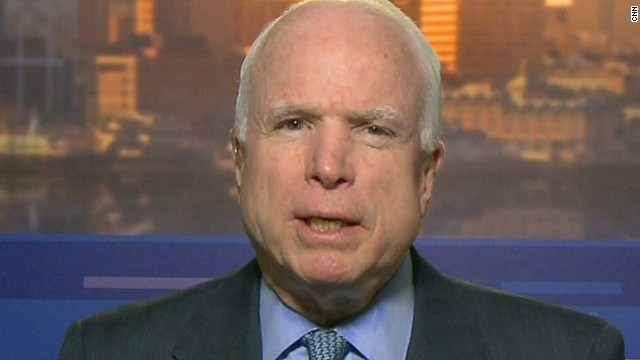My heroes are not necessarily people of great ability but ones who did what I think I could not.

Senator John McCain
Two contemporary men fall into that category. The first is the late Muhammad Ali, maybe the greatest fighter of all time, and the second is John McCain. Now, from the grave, Ali reprimands McCain.
Both Ali and McCain chose to make sacrifices on matters of great principle. Because Ali was a conscientious objector and opposed the Vietnam War, he refused induction into the Army and was banned from boxing. For three and a half years, at the prime of his career, he could not fight professionally. He lost millions of dollars. He lost time. He lost what he could never replace.
McCain, too, took a stand on a matter of principle. As a prisoner of war in Vietnam, he was offered an early release because his father was an admiral and commander of U.S. forces. The North Vietnamese wanted the propaganda coup, and McCain, although tortured, would not give it to them. “First in, first out” was the Navy rule. For McCain, the torture resumed.
Most men, I think, wonder about their courage. How would they act in combat? Under torture? Would they do what McCain did: risk death for a principle and a matter of honor? Would I do that? God, I hope never to find out.
It was similar with Ali. A fighter is on a short clock. He has only so many fights in him. Even the odd punch, the slip on some wet spot in the ring, could end a career. A fighter’s entire inventory, his back and front office, is what he wakes up with every morning. Ali took all that and put it aside. He would not kill North Vietnamese. He would not kill Viet Cong. He famously said that they were not his enemy.
Ali was respected not just for his fighting abilities but for his indomitable strength of character. McCain, in contrast, has proved that he would rather win an election than be right. His choice of Sarah Palin as his running mate in 2008 was not just odd, it was irresponsible — the decision of a man who wanted so much to win he risked all on his continued good health and splendid good luck. None of that mattered anyway. He lost.
McCain’s decision to back Donald Trump is similar. Clear principles are involved, not the least of them being decent respect for the experiences of prisoners of war, which Trump has denigrated. But there are others, and they are by now the familiar ones that can be encapsulated in single words: racism, sexism, misogyny, ignorance, inexperience, lying, bigotry. As a presidential candidate, Trump seems heaven-sent just to make fools out of Republicans. He has succeeded splendidly with McCain.
I do not belittle McCain’s dilemma. On the contrary, I find it poignant. He is in a tough reelection fight, and he needs the support of Trump voters. He is almost 80 years old. I know too many men his age — and it is nearly always men — who peer into the abyss of retirement and see it as a sort of pre-death. No second career can follow, just a white, arctic silence — no phone ringing, no one stopping by, emails diminishing until spam itself is welcomed. Click. Take a chance. Maybe someone still cares.
Trump has given Republicans a choice. They can, as Mitt Romney has, denounce the presumptive nominee for the one-man gong show he is and work for his defeat — or they can put their own careers over what’s good for the country and lay low. (Those who have embraced Trump, such as Chris Christie, have raised the bar on opportunism.)
McCain appears disoriented by what he has done. His recent statement — quickly retracted — that President Obama was somehow “directly responsible” for the massacre in Orlando, is evidence of a man who has lost his political balance. He doesn’t know anymore who he is or what he stands for — or what, aside from winning, he wants.
Heroism is a matter of choice. Muhammad Ali made his choices. He chose to be true to his beliefs at the cost of his irreplaceable youth. As for John McCain, he risked not just his career but his very life. I don’t know if I could have done what he did then. I do know, though, I could not do what he’s doing now.
Richard Cohen writes for the Washington Post Writers Group.